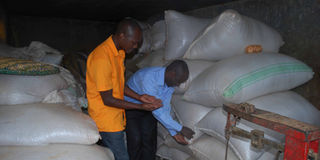Farmers’ coop strives to become seed producer

Laban Mwanika, a seed expert and Stanley Begumisa, the coop’s quality control officer inspect the seed.
What you need to know:
It started out as a farmers’ group of 15 members who aimed to combat hungerand poverty in their community, now it is 200- strong with bigger plans.
Kyazanga Farmers Cooperative Society Ltd in Lwengo District is becoming a recognisable name in farming circles within the district and beyond.
In the recent years, they have emerged as bean seed producers where an increasing number of farmers in the neighbouring communities tend to go for high yielding seed every planting season.
As Stanley Begumisa, who is the society’s Quality Control and Marketing Officer, points out, Kyazanga Farmers Cooperative Society which began as a small farmers group in 1997 was not anything much to talk about in its early years.
Growth in membership
“Its earlier name SHUPO was about its target ---to fight sickness, hunger and poverty (SHUPO) and it was like any of the farmers’ groups organised under the Naads program with a membership of about 15,” he recalls.
“This time round the name has changed given the new programmes we have opened up including credit and savings. The membership has grown to almost 200.”
Working closely with Namulonge Agricultural Research Station and the Netherlands funded ISSD (Integrated Seed Sector Development), the farmers grow beans which they sell as seed to fellow farmers, some NGOs and NAADS.
“We are not yet officially approved as a seed company but we do have a certificate of seed production under Namulonge,” Begumisa explains. “The seed breeders in Namulonge bring to us the seeds that we plant and grow under their direct supervision. We find it so profitable because seeds are sold at a higher price given their good quality and intricate process of production.”
He particularly mentioned Dr Stanley Nkalubo, Gabriel Luyima, Laban Turygenda, Chris Mwanika and a Dutch national, Astrid Mastenbrock, among the seed experts that are their regular supervisors.
Products
The cooperative society produces seeds that are drought resistant, fast maturing, disease resistant and good tasting. They include NABE 15, which he said is ready for harvest in two months, and NABE 16 and NABE 17 which are harvested in about 70 days after planting. He said NABE 17 is more nutritious because it contains iron. The seeds are grown in rotation.
If a farmer grows NABE 15 this year, the next year that farmer grows another variety, like NABE 17. All farmers are required to sell their beans through the cooperative and each member is expected to save with the society between Shs10,000 and Shs100,000 every month.
When this reporter paid them a visit in early August, an MP from the Netherlands, Sjoerd Sjoerdsma and Henny Gerner, First Secretary, Netherlands Embassy were visiting the farmers to assess how they were getting on with the seed production process.
Plans to expand
Sjoerdsma listened to the farmers’ different tales of achievements, made out of bean seed production that included constructing new houses and paying their children’s school fees.
Their current challenges include drought, poor storage and soil degradation all of which are however being addressed.
“So far as a cooperative society we have bought a piece of land on which we want to build a seed store and offices,” Begumisa disclosed.
Currently, the personal residence of the coordinator, Joseph Asiimwe, is used as the co-operative society’s premises.
In the near future, the society will embark on groundnut seed production in addition to bean seed production, which Begumisa revealed as his group’s future plan




